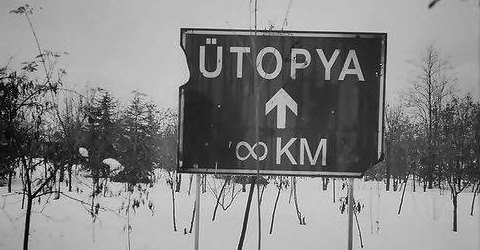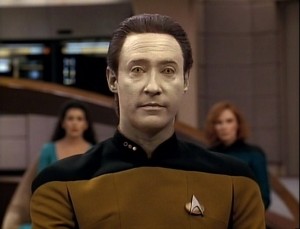The Prime Directive is not just a set of rules. It is a philosophy, and a very correct one. History has proven again and again that whenever mankind interferes with a less developed civilization, no matter how well intentioned that interference may be, the results are invariably disastrous. —Jean-Luc Picard, Symbiosis
The utopian future of Star Trek (most specifically, that of The Next Generation [TNG]) is sometimes described as an idealized liberal world. We’re told early and often in the series that mankind has “evolved” beyond its former pettiness and brutality, demonstrating that such problems as war, economic iniquity, and factionalism can simply be socially engineered away. Ultra-liberal idealism and optimism have appealed to a surprisingly wide audience, as documented in the films Trekkies and Trekkies 2. There is much to applaud in Roddenberry’s vision: multiculturalism, reasonably decent treatment of sex and gender for the 90’s, and an uncompromising secularism. Unfortunately, TNG also encodes some of the utter failures of 20th century liberal thought. The consequences of adopting them, whether in fiction or real life, can be pretty horrifying, not to mention morally disgusting.

To be clear, I’m a fan. Not the convention-going sort, but I loved TNG and some of the subsequent series as well. TNG really shines in moments as a sci-fi Aesop’s fables where virtues and ideals are compared and explored. The most important virtue in the Trek universe is the Prime Directive. Why else would it have that name? On the surface, it sounds like a good idea: don’t screw around with other cultures.
The Prime Directive is almost surely a reflection (see quote above) on the tragedies of the imperial age in which western European nations invaded, destroyed, and exploited many peoples of the rest of the world as well as the proxy wars fought by the United States against communism. This imperialism & warfare was largely justified by an ethnocentric bigotry, an assertion of racial superiority and the judgment of indigenous peoples as inferior. The Prime Directive articulates one form of liberal response to this: stop interacting entirely, and stop using judgment of any kind. The latter sentiment is known as moral relativism, the notion that nothing is inherently good or bad and can only be judged from inside a culture and not from without or between. This response is intellectually lazy, refusing to consider that intervention can have a mix of effects, and in fact can’t always be avoided no matter the intention. It is nothing we should celebrate. It leads, even in fiction, to immediate horrors and tragedies and is demonstrably impossible to uphold even by those fictional virtue warriors who swear by it.
The short road from good intention to blind dogmatism
When we first hear about the Prime Directive in the original series (TOS), it seems like a helpful guideline, something to bear in mind. However, as so often happens in real life, it becomes an edict, and finally an inviolable rule which is upheld by force and not reason. In Trek, arguments about the Prime Directive in which principled disagreement are a part are generally shot down by force, by the pulling of rank, as if thoughtful consideration of consequences is irrelevant even to matters of an entire race’s survival. This criticism of the Prime Directive is well discussed in the following video. I found it at WIMP.com and at Firecold, but I do not know its author.
Video: Looking at Star Trek’s Prime Directive
Bewildering moral indifference to suffering, genocide, and all manner of tragedies
The Picard quote at the top comes from a season 1 episode called Symbiosis. The story pertains to two worlds in which both were ravaged by a plague in the distant past. One appeared to recover from the plague, and also began selling a “treatment” to the other which turned out to be an addictive narcotic. In short, one world consists entirely of rich drug dealers, and the other world drug addicts hopelessly dependent upon them. After Dr. Crusher tells the captain that it would be relatively easy to ease the population -of millions- off of the drug, Picard is not moved to intervene, citing the Prime Directive. He refuses even to tell them that they’re not diseased or dying. The suffering and exploitation of millions of people is simply not his problem.
By the end of the episode, Picard refuses to help repair ships needed for the drug-dealing to take place, also citing the Prime Directive. Some say this is his solution to the non-interference dilemma, but two problems: First, he is, in fact, abiding the Prime Directive and shows no sign his actions are retributive. Second, this “solution” means that the population of the addicted planet will go through a planet-wide time of horrible Heroin-like drug withdrawal. They will not be given the benefit of even information about their condition that Picard could easily supply. They will think that they will all die soon, even though they aren’t dying. Clearly, the society, fearing the end of their civilization, will quickly descend into panic, violence, and wide-scale suicides. But hey.. at least we didn’t interfere. Right? Because then things could have gone badly.
In Homeward, an entire planet populated with unknown numbers of people is suffering environmental collapse. Lt. Worf’s brother Nikolai, in a rogue action, moves to save a village of a couple hundred people. Nikolai is repeatedly chastised for doing so (see video below). Picard was more than content to let every person on the planet, including the village, perish. Having been told by Data that the planet will be “uninhabitable within 38 hours” meaning, everyone dies, Picard gives instructions to Worf, who is going to investigate Nikolai’s apparent disappearance. His bizarre orders illustrate the sociopathic dogmatism of the Prime Directive:
You must observe the Prime Directive. I want to minimize the risk of contact with the inhabitants. You will go down alone, Mr. Worf, and I want to have you surgically altered so that you can pass for a Boraalan.
Picard is expressing concern for upsetting the natives, which would just ruin their whole “everyone dies” party happening in 38 hours.
From Homeward: Picard’s chilling response to Nikolai’s request that the lives of hundreds of villagers be spared using readily available technology & Crusher’s sane objection
In contrast, the episode Pen Pals revolves around Lt. Commander Data’s communication with a child on a doomed planet. Data wants to help the child, and this prompts a meeting with the entire senior staff where they discuss the philosophy of the Prime Directive. The Enterprise does try to save the planet, by putting their best man on the job, a 14-year-old acting ensign. It’s pretty clear that if their non-invasive attempt at preventing volcanic calamity failed, no further effort would be made to save the populace because Data’s contact with a single person is constantly met with regret and resistance. Initially, Picard orders Data to break off contact with the child, sealing her fate. He changes his mind only after inadvertently hearing her plea for help. Data ultimately rescues the girl, and Ensign Crusher boy-wonder saves the planet.
In the Trek universe, the planet Bajor’s invasion, oppression and genocide at the hands of the Cardassians are a thin metaphor for those of Nazi Germany. Throughout TNG and Deep Space Nine, The Federation turns a blind eye, in the name of the Prime Directive. Unlike the real Nazi Germany, where the allies could somewhat claim ignorance, Star Fleet knows that the Bajorans are being massacred and subjugated by the brutal Cardassian invaders. It is dismissed as an “internal affair”. This must be stated: The Prime Directive literally means you can’t move against the Nazis, no matter what they do, short of attacking you.
Failed analysis: intervention has no intrinsic moral valence
In the real world, imperialism was, or perhaps is, horrific. The alternative was not isolationism, though. Our planet has been made small by communication and transportation technologies. This means that everyone has to adjust to the rest of the world. I don’t mean by being exploited by it, but I do mean by keeping up with what else is happening. It isn’t enough for just Europe to fight global warming, for example- everyone has to.
What about, say, Japan, in which the end of isolation and the start of modernization lead to a ferocious war machine? Certainly that was awful, but it’s also 70 years gone and today Japan is an upstanding member of the community of nations: modern, sophisticated, and scientifically advanced. Will we really argue that we’d prefer a feudal Japan, kept in an isolationist jar to the one that exists today?
What about aid practices? The US and Europe provide underdeveloped countries with billions in aid each year. Charity and nonprofits provide relief efforts and help governments respond to devastating health problems like HIV, Polio and Malaria. A “Prime Directive” would forbid all of this (and in the Trek universe, has done so).
Even in the fictional universe, the Prime Directive doesn’t make any long-term sense. The Klingons, once cited as the reason why the Directive is necessary, became decisive in the victory over the Dominion. Generally, “first contact” with a civilization is permitted when it has or is very close to having warp drive. Why should this matter? Even non-warp civilizations are likely to be visited by non-federation space-faring societies, thus contaminating them anyway. Why not prevent them from being exploited ala Bajor? Also, such planets could easily have advanced radio and optical telescopes (and other sensor technologies) allowing them to notice the apparently common starship traffic around the stellar neighborhood.
No one really believes in it— not even Picard
The saving grace of TNG and the original series (TOS), is that its characters ignore most of the dumb rules they claim to subscribe to. Case in point, in Symbiosis and in Homeward, Dr. Crusher finds Picard’s astonishing disregard for human suffering unconscionable and says so. In Pen Pals, Dr. Pulaski calls the rigid application of the Directive “callous and maybe cowardly”. The compassion of both doctors is cast aside with rank-pulling and blow hard-y speeches about ideals of non-interference which challenge nothing about their reasoning.

Captain Kirk essentially blows his nose with the Prime Directive when he feels like it. He violates it, usually without remark, here, here, and notably, here, where Kirk gives his interpretation of the Prime Directive that allows him to apply it rather loosely: “…the Prime Directive was intended to apply only to living, growing civilizations and felt it was appropriate to interfere where societies had been enslaved or were in a state of total stagnation.” (source Memory Alpha).
Picard is often a psychotic ideologue when it comes to the Prime Directive, which makes his frequent breaks with it worth a closer look. In The Drumhead, a Star Fleet Admiral notes that Picard has violated the Prime Directive nine times in just three years. Picard waves this off with a remark about justifiable “circumstances”. It’s worth noting that Picard is never punished or apparently reprimanded in any way for these nine violations, which goes to show even Star Fleet isn’t terribly hung up about the Prime Directive. When and why does Trek’s biggest Prime Directive fan act against it? It seems to be the case when he is upholding some other ideal equally detached from human suffering, or when it impacts him personally.
In the episode Justice, Wesley Crusher has inadvertently broken a trivial law on a world called Edo, and is to be put to death. Picard & co will not permit this, even though they know powerful god-like beings are threatening to destroy the entire Enterprise if they interfere. In this episode, Data asks Picard if he would sacrifice a life to save a thousand. Picard answers, quite honestly, that he’ll not let arithmetic answer those questions. It seems he’d rather let slavish devotion to an abstract ideal decide them. Picard favors justice for Wesley over the Prime Directive. This sounds reasonable, until it’s clear that, actually, Wesley’s life means nothing, only the injustice of his punishment. As Picard attempts to beam up with Wesley, he knows that the Enterprise, Wesley, and everyone aboard will probably be killed as a result. But that’s okay, they’ll all die martyrs for the ideal of justice. Thanks for the virtue lesson, captain.
In Pen Pals, as mentioned, Picard is moved (thanks to android Data’s constant requests) to save a single child on the basis that she apparently has a radio that can transmit on Federation frequencies. Picard explicitly justifies saving her on the basis that she’s made a “plea for help”. Well, I guess it sucks to be anyone else on that planet who shall perish because they don’t have a radio. Ditto for untold thousands or millions on Boraal II. Meanwhile, planets like Bajor who have been invaded and subjected to torture and genocide do plead with the Federation to help, which coldly turns them down— maybe they should have tried being a little girl with a radio.

In the Trek film Insurrection, Picard stages an.. well an insurrection against Star Fleet admirals and works to help an alien race in total violation of the Prime Directive. This seems to be okay, because they’re attractive hippies that appeal to Picard and his crew. Picard is willing to sacrifice his career and his life, for pretty white folks who believe things that he believes, too.

In the film Nemesis, which ends the TNG saga, all pretense to concern for the Prime Directive is gone, because dune buggies are fun:
The list of Picard’s obtuse, stochastic treatments of the Prime Directive is long and this post is long enough. Not to pick on Picard or TNG, all of the Trek captains routinely break the rule.
Memory Alpha, the de facto wiki of Star Trek, attempts to explain exceptions to the Prime Directive. To do so, the authors try to shoehorn all of the examples into twelve categories. It is further explained that there are two specific Star Fleet regulations suspending the Prime Directive. It is granted that every law has mitigating circumstances and there are exceptions to every rule, but maybe if your rule needs 14 classes of exceptions, it’s a bit too simple and naive to hold as “general order number 1”. Maybe Picard’s certainty that it is “a philosophy and a very correct one” is a bit stronger than it ought to be.
Hard work: Where few have gone before
This essay is not about Star Trek. Star Trek is just a reflection of a particular sort of moral and political philosophy which exists in our culture, the kind that inspired Gene Roddenberry to dream of a future without inequality and starvation. His optimism was striking and his vision compelling, but he also wasn’t a philosopher or a social scientist. He didn’t really know how to bring about these changes, so he did it with a rule book and writer’s magic wand. We can keep the optimism, but we must buttress it with a more sophisticated moral framework. We can not regulate away hard moral problems, like when and how to intervene in the affairs of other societies. When a hurricane rocks Haiti, almost everyone agrees that we should help, and we did. When Germany invaded Poland, almost everyone agrees they should not have done that because Poland is a sovereign nation. Now, most of the choices we make fall between these extremes. Which governments do we support? Where should our aid go? What sort of aid? is it okay to buy things from third world countries, or to sell thing there?
These are hard questions which we might never know the correct answers to. I posit only that the correct answer is never to abdicate consideration, to turn our backs and toss up our hands and say, sorry, Prime Directive! To the Prime Directive, the war in Vietnam and the war against Hitler are identical and equally wrong. We can’t afford such mindless, irrational dogma. Our world is an interconnected one with no truly isolated peoples. Our moral world should be even more connected. We should carefully consider our actions and inactions, and we should try to make life better for those who share the planet with us. We should do this, even when the issues are complicated and solutions imperfect. We should do this even knowing we will fail sometimes. The answer to unsavory ethnocentric judgement of the past is not no judgement, it’s better judgement.
No bright future is rightly expected by those inextricably tethered to intellectual & moral disregard.
